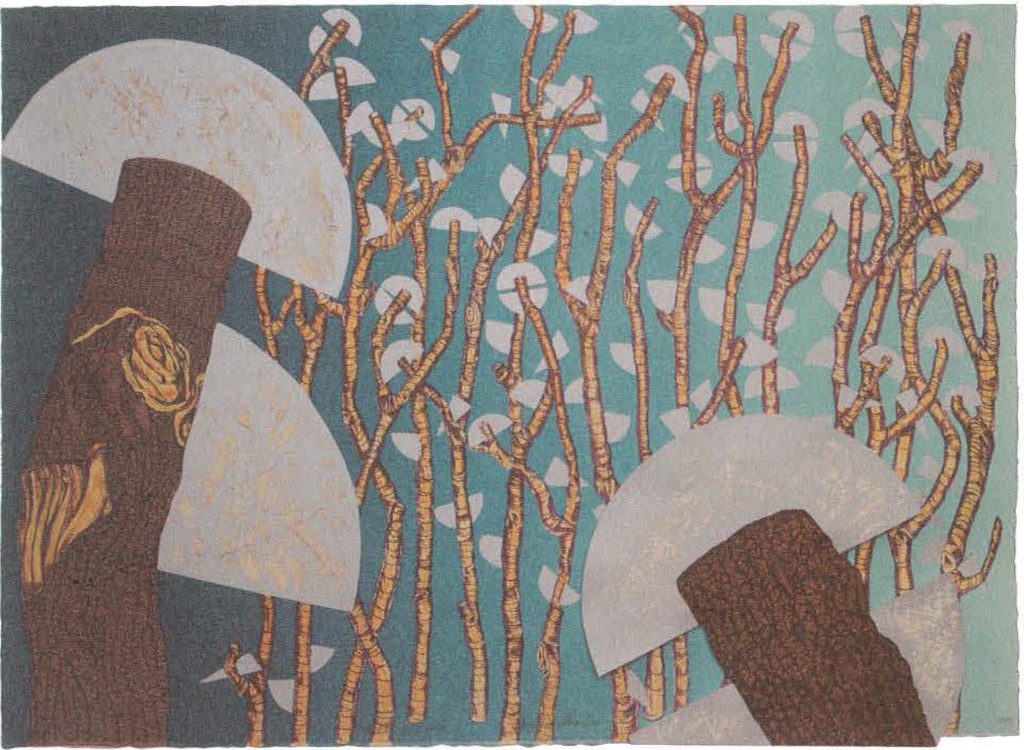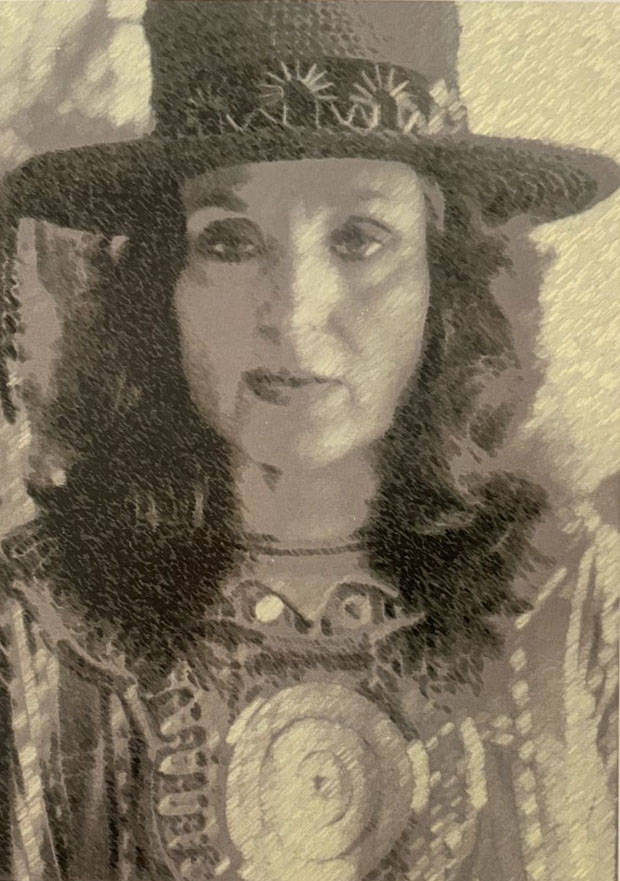
Beyond the Year 2000
Joyce de Guatemala
- 1993
- Color offset lithograph and screenprint paper construction with foam core board
- 21 5/8 x 30 1/16 x ½ "
- 2009-61-96
About the Print
From the Artist
My work requires that the viewer take time to see rather than just look.
—From Brandywine Workshop and Archives records
Joyce de Guatemala created this print, Beyond the Year 2000, in 1993. In the image, tall tree trunks and branches stretch upward against a brilliant turquoise-blue background, which fades in intensity from left to right. The bark has been scraped away, revealing the golden interior color and leaving a pattern of curved lines along the surfaces. Inspired by shapes found in Mayan sculptures, silver halfand quarter-circles adorn the two larger tree forms in the foreground (which are collaged) and the thinner branches behind them. Bending and swaying, it’s as if these forms are on stage performing for us, suggesting the inner life of the gods, deities, or dynamic elements of wind and water.
—From Brandywine Workshop and Archives records
Let's Look
- What kind of place is this? What do you see? What would you hear? What time of day might it be?
- What mood or feeling does this image have? How do the shapes, lines, colors, and textures help create that mood?
- How does the artist create a sense of movement?
- De Guatemala had a strong interest in ancient Mayan art, culture, and mythology. She often described the natural world in her work as being inhabited by gods and deities. How does she make these treelike forms appear to be alive?
About the Artist
Mexican sculptor and printmaker Joyce De Guatemala studied fine arts at the National Autonomous University of Mexico, Mexico City, and the University of Wisconsin, Madison.
De Guatemala was an active member of the Philadelphia Art Alliance, Brandywine Workshop and Archives, and the Institute of Contemporary Art, Philadelphia. She served as the president of the Fine Arts Committee for Patronatos de Bellas Artes, and on the board of directors for the Latin American Guild for the Arts. Her sculpture Hunters of the Dawn is in the collection at Temple University, Philadelphia, where it is installed on campus.
Following her sudden passing in 2000, the Joyce De Guatemala Scholarship Fund was inaugurated in her honor by Brandywine Workshop and Archives. The fund supports visiting women artists at Brandywine Workshop and Archives, providing wider access to resources and opportunities for artists from Latin America disadvantaged due to economic and geographic barriers.
—From Brandywine Workshop and Archives records
Curriculum Connections
Suggested Topics for Art Projects, Group Discussion, and Independent Writing
Art
Patterns and Textures in Nature
Make a close-up photograph or drawing of an object in nature (plant, bark, rock, water) by zooming in on its patterns and textures. The specific identity of the object may be lost. As an extension, make a print based on your photograph or drawing.
Nature Sculpture
Joyce de Guatemala made sculpture based on nature. Gather natural materials (and perhaps other materials) to create a 3-D sculpture based on an element of nature such as rain, wind, or sun. What will the theme be? Will you place it outdoors or inside? What color(s) will it be?
Language Arts
Fib Poem
Create a Fib poem inspired by this artwork. A Fib poem is similar to haiku but based on the Fibonacci number sequence. Often found in nature, the Fibonacci sequence begins with the numbers O and 1; each subsequent number is the sum of the previous two: 0, 1, 1, 2, 3, 5, 8 ... The typical Fib poem is a six-line, twenty-syllable poem, and the syllable count per line follows the Fibonacci sequence: the first and second lines each contain one syllable, the third line has two, the fourth has three, the fifth has five, and the sixth line has eight.
In Your Opinion
"My work requires that the viewer take time to see rather than just look."
Consider de Guatemala's quote about her artwork. In your opinion, does Beyond the Year 2000 reflect the spirit of her words? How? If not, why not?
Social Studies
Mayan Culture
De Guatemala was inspired by Mayan culture and its focus on nature. Research Chae and Yum Kaax, the Mayan rain god and the Mayan lord of the forest, their significance in ancient Mayan civilization, and why their names still have meaning today.
